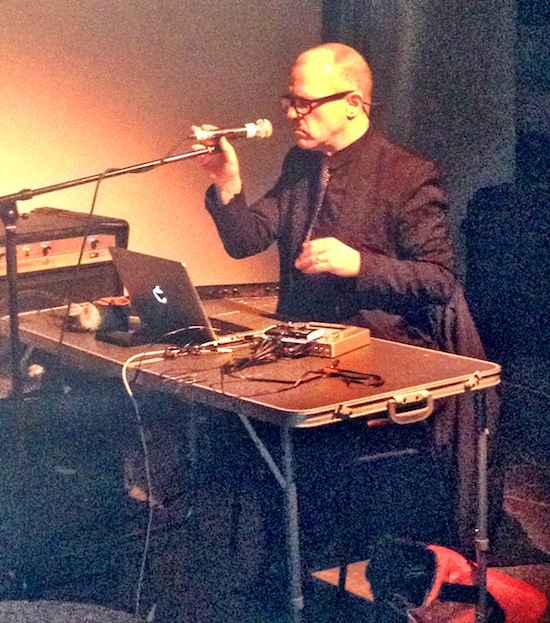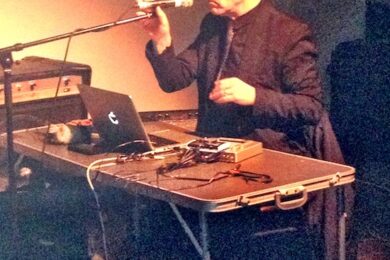Graham Lewis
Wire’s Graham Lewis does the honours, opening both the weekend part of the Quietus-assisted Drill:London… and a gaping abyss in the middle of everyone’s Friday evening. Dressed in black, save for white spots on the tie, Lewis gives a deceptively gentle, careful twist of the dials and works up a sonorous, warped wall of sound for the first ten minutes, occasional rumbles of bass somewhere down low.
All eyes are on the pink glow on Lewis’ palms given off by the Kaos pad, and it’s hard not be hypnotised as the surgeon’s hands go to work. At some stage, there is a terrifying crash from out of nowhere, and a few nervous faces. After a ten minute ambient descent, which turns out to have merely been a way in, Lewis tilts the mic to his lips, and an industrial beat emerges from the fog. The glasses come off, signalling business, and the mouth opens, unleashing a baritone growl.
Bitcrushed drums sit somewhere in the back of the room as Lewis intones: "Life as a loner, it left me a touch colder". After a few restrained verses of the track smouldering, his head tilts back, suddenly the voice soars, and he belts out a near-Gregorian chant that loops and multiplies. As the track peaks, that abyss threatens to widen and suck Lewis in.
Klara Lewis
Klara Lewis hides the machinery she’s playing in a kind of light-box, and has torches attached to her hands. I wish more musicians had torch-hands. Everything you hear tonight, every beat, every flutter, every scrape, stems from field recordings. I’m convinced there’s a warm synth pad at play towards the end and I have to check. I am slapped down; it really is all found sound.
Listening to Klara, I’m reminded of Jonathan Meades’ argument about places being the ‘greatest of free shows’. There’s something thrilling about music made from mundane, real-world sounds, giving life to the idea that the most interesting stuff is actually all around us if we pay a bit of attention. Watching her hands from the side of the light-box, you can see the fingers manipulating recordings to tease out hidden rhythms, chopping up and altering what would have passed most of us by, picking out secret patterns with her fingertips.
The set evokes the giddy, slightly nightmarish thrill of getting lost in a city you thought you knew like the back of your hand; there’s familiarity and strangeness all at the same time. The tail end of the set nudges at conventional dance and the feet start to tap, though at some points you wonder how much you’re actually hearing and how much your mind is filling is, such is its slightness. Teasingly, just as we’re getting comfortable, Clara slams shut her laptop before the noise has a chance to properly dissipate.
Land Observations
Introducing, Quietus editor Luke Turner points out that, right now, on nearby Kingsland Road – one of the oldest roads in England, fact fans – East London’s finest are paying tribute to their forbears with an offering of vomit and piss, it being Friday and all. For a more respectful reading of history, try Land Observations, opening with the icy ‘Before The Kingsland Road’, from last year’s perambulation-tastic ‘Roman Roads’ LP.
Live, Land Observations is a less muted, less restrained prospect. The tracks shimmer, and the roads seem to sprout new byways as James Brooks tweaks and extends them. ‘Appian Way’’s polite Krautrock car chase gets an extra chime thrown over the canvas, and a high-pitched, delayed bonus riff is the icing on the cake. Audiences heads each bob to a separate loop, different people picking something unique to latch onto.
As Brooks, armed only with guitar and hypnotically blinking bank of effects pedals, gently works each track to to a pinnacle, some heads twitch, others loll. Although the final chimes of ‘Via Flaminia’ sound mournful, by this time the back of the bar is rowdier, and the bustle seems to add rather than detract, as though the unpopulated streets from the record are now thronged with people.
Scanner & Gazelle Twin
We come full circle, Wire-wise, as Scanner (aka Robin Rimbaud) conducts a 30-minute dissection of Gazelle Twin’s already-sparse cover of ‘Heartbeat’, backed up by her visuals. The projections take us away from the highways of Land Observations and into another taken-for-granted topography altogether; the human body. Greyscale brain matter glistens. The rocky ridges of the back quiver. Palms are magnified so they seem strangely alien. We spot a chipped tooth.
Scanner wields a buzz-saw of noise, marauding sub-bass, and dark, gated synths that battle each other. Rattling drum rolls dip in and out. At one point, the cacophony falls away and close-ups of the brain on the projector twist into a dizzying tornado of pink and orange matter. If you’re sharp-eared you pick up the constantly-shifting track’s next movements as they bubble under the surface; otherwise, they just creep up on you.
Most of the piece is free from vocals, so when Elizabeth Walling finally appears, just as snares and hi-hats come to dominate, it’s more than a little haunting. Her voice is treated to an unsettling degree; recognisably human, but detached enough to make you wriggle. Eventually the voice becomes just another bit of texture. Later, on-screen, an electrical storm breaks out across the shoulders, and the performance hurtles towards a high drama finale. In the end, we’re left with little but the heartbeat.



